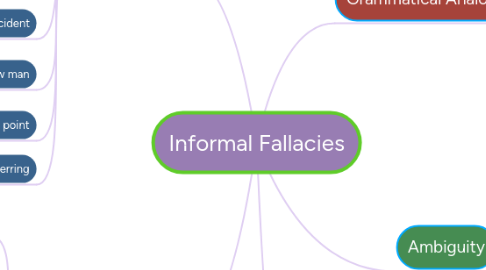
1. Relevance
1.1. Appeal to force
1.1.1. Arguer threatens reader/listener.
1.2. Appeal to pity
1.2.1. Arguer elicits pity from reader/listener.
1.3. Appeal to the people (direct)
1.3.1. Arguer arouses mob mentality.
1.4. Appeal to the people (indirect)
1.4.1. Arguer appeals to reader/listener’s desire for security, love, respect, etc.
1.5. Argument against the person (abusive)
1.5.1. Arguer verbally abuses other arguer.
1.6. Argument against the person (circumstantial)
1.6.1. Arguer presents other arguer as predisposed to argue this way.
1.7. Argument against the person (tu quoque)
1.7.1. Arguer presents other arguer as hypocrite.
1.8. Accident
1.8.1. General rule is applied to a specific case it was not intended to cover.
1.9. Straw man
1.9.1. Arguer distorts opponent’s argument and then attacks the distorted argument.
1.10. Missing the point
1.10.1. Arguer draws conclusion different from that supported by premises.
1.11. Red herring
1.11.1. Arguer leads reader/listener off track.
2. Weak Induction
2.1. Appeal to unqualified authority
2.1.1. Arguer cites untrustworthy authority.
2.2. Appeal to ignorance
2.2.1. Premises report that nothing is known or proved, and then a conclusion is drawn.
2.3. Hasty generalization
2.3.1. Conclusion is drawn from atypical sample.
2.4. False cause
2.4.1. Conclusion depends on nonexistent or minor causal connection.
2.5. Slippery slope
2.5.1. Conclusion depends on unlikely chain reaction.
2.6. Weak analogy
2.6.1. Conclusion depends on defective analogy.
3. Presumption
3.1. Begging the question
3.1.1. Arguer creates the illusion that inadequate premises are adequate by leaving out a key premise, by restating the conclusion as a premise, or by reasoning in a circle.
3.2. Complex question
3.2.1. Multiple questions are concealed in a single question.
3.3. False dichotomy
3.3.1. ‘‘Either . . . or . . .’’ statement hides additional alternatives.
4. Ambiguity
4.1. Equivocation
4.1.1. Conclusion depends on a shift in meaning of a word or phrase.
4.2. Amphiboly
4.2.1. Conclusion depends on the wrong interpretation of a syntactically ambiguous statement.
5. Grammatical Analogy
5.1. Composition
5.1.1. Attribute is wrongly transferred from parts to whole.
5.2. Division
5.2.1. Attribute is wrongly transferred from whole to parts.

